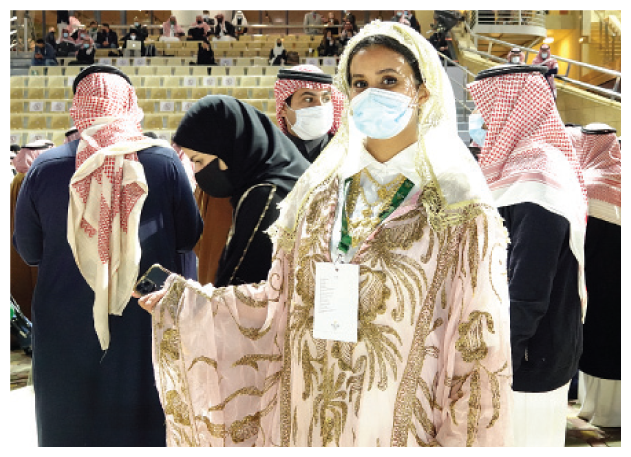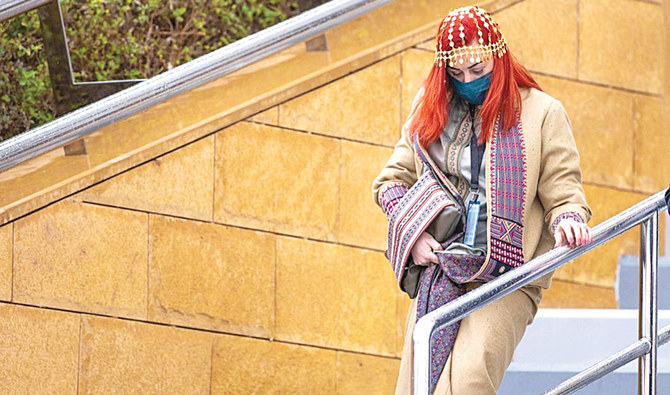MAKKAH: With Saudi Arabia’s diverse and colorful cultural traditions, fashion serves as a medium where foreigners and citizens can meet.
Fashion has always been an important part of how people define themselves and others, and Saudi Arabia’s traditional clothing is no different.
Those who watched the Saudi Cup horse race coverage would have noticed that many racegoers, including foreigners living in the Kingdom, donned eye-catching pieces from the Kingdom’s regions, while others made sure they showed off traditional fashion items.
For almost 12 years, Brandi Janow has made Saudi Arabia her home. Janow, who calls herself an “American Saudi,” caught the eye of photographers at the Saudi Cup with her striking red hair and gold coin headpiece while wearing a farwa (heavy overcoat) featuring a Sadu piece, or traditional embroidery of the region, on her coat lapels.
Janow told Arab News that she felt welcome and comfortable since moving to the Kingdom, and dressed according to the traditions of the land.
“The fashion scene was remarkable at the Saudi Cup. I am going to dub it the ‘Met Gala’ of Saudi Arabia in future. Saudi Arabia has such an old fashion heritage, so it was wonderful to be able to take a trip through history and to tell the world a story,” she said.
Saudi Arabia has changed immensely since 2009, and that is something I have appreciated witnessing.
Brandi Janow
“As a history lover, this is probably one of the best places that I can be to see so many remarkable sights with my own eyes,” she added.
Celebrating Saudi Arabia’s heritage, fashionable guests appeared in pieces that highlighted the Kingdom’s diverse heritage, including intricately embroidered daglahs for men and the heavily embellished zaboon worn by the women of Hijaz.
Janow calls Saudi Arabia her home and is “happy my journey brought me here.”
HIGHLIGHTS
• For almost 12 years, Brandi Janow has made Saudi Arabia her home. Janow, who calls herself an ‘American Saudi,’ caught the eye of photographers at the Saudi Cup with her striking red hair and gold coin headpiece while wearing a farwa (heavy overcoat) featuring a Sadu piece, or traditional embroidery of the region, on her coat lapels.
• Janow told Arab News that she felt welcome and comfortable since moving to the Kingdom, and dressed according to the traditions of the land. She calls Saudi Arabia her home and is ‘happy my journey brought me here.’
The private sector worker is also the program director for art, culture, media and entertainment at the American Chamber of Commerce in the Kingdom and also manages Smuug, a small business where she designs and sells products based on her illustrations.
“Before I came to Saudi Arabia I had never traveled outside North America, so I was quite excited to see a new place. I cannot say that I ever experienced culture shock, but I was in awe of how different the country was from my own. It is really beautiful how big the world is, and how different (and the same) we all are,” she said.
“Saudi Arabia has changed immensely since 2009, and that is something I have appreciated witnessing. I really think that humanity cannot prosper without change, growth and evolution.
“This is the natural way of life. As someone who works in the creative industry, it has been such a pleasure to watch the blossoming of talent,” said Janow.







































